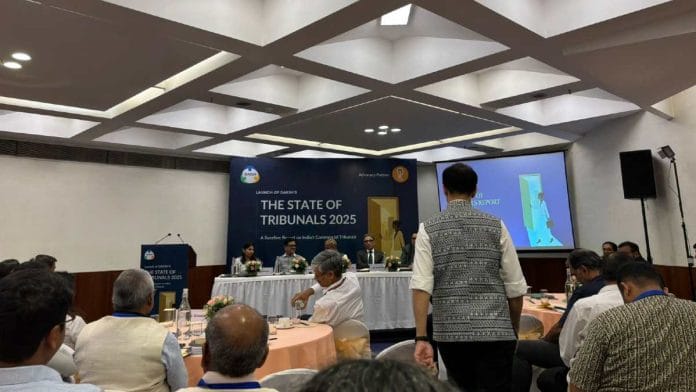New Delhi: Tribunals have distinct problems compared to courts, such as the need for more judges with specialised or technical knowledge of the law, the necessity for faster and more economical methods of adjudication, and the lack of finality when it comes to their decisions, former Supreme Court judge Justice Shiva Kirti Singh said Thursday.
The judge, who has served as the chairperson of Telecom Disputes Settlement and Appellate Tribunal (TDSAT), was speaking at the launch of the DAKSH report on ‘The State of Tribunals 2025’, a comprehensive database on India’s commercial tribunals.
DAKSHA is a research institute dedicated to law and justice reforms in India, that routinely works with data, policy research and stakeholder engagement. The report covers 10 major commercial tribunals across company law, taxation, securities, debt recovery, insolvency, energy, telecom and goods & services tax.
Justice (retired) Singh was part of the panel that deliberated on the existing gaps in the tribunal system. He narrated some of the dismal experiences he had as TDSAT head and stressed on the need to strengthen tribunals and give them more teeth, given that they look at a number of disputes that have an impact on the country’s economy.
“A class of specialised judges is needed in these tribunals, and more expert opinion needs to be infused in these judgments. It is important to hold judges accountable if they are not deciding cases,” the former SC judge said, adding that accountability leads to rewards and creates synergy.
Justice Singh also said that many of the tribunal judges are already leading “a retired life”, where they sit in the tribunals for only two-three hours a day. He spoke about how, despite the extremely large number of disputes coming before the tribunals, there is still no serious discussion about the judge-population ratio. This is further complicated by the fact that many other tribunals have no work, he said, while suggesting the dissolution of such out-of-work tribunals.
India’s commercial tribunals, including the Income Tax Appellate Tribunal (ITAT), the National Company Law Tribunal (NCLT) and the Debt Recovery Tribunal, are grappling with a backlog of more than 3.56 lakh cases, worth Rs 24.7 lakh crore. The value of these pending cases amounts to about 7.48% of GDP for 2024-25, while these tribunals are being run by only 350 members. Among these, the ITAT alone accounts for pending disputes worth 2.11% of GDP, according to the DAKSH report.
Apart from Justice Singh, former Madras High Court judge and incumbent National Company Law Appellate Tribunal member Justice N. Seshasayee, senior advocate Harish Narasappa, who founded DAKSH, and insolvency expert advocate Sumant Batra shed light on the key takeaways from the report.
Also Read: Railway officers challenge ministry’s services demerger in CAT, call it arbitrary & unconstitutional
‘Parking spots’
The report highlighted challenges to the independence of tribunals in the form of executive dependence in appointments, tenure and service conditions, alongside concerns about the quality of adjudication in tribunals.
“Some tribunals are here to stay, but others need to reinvent themselves. A revolutionary approach is needed,” said Batra, former president of INSOL International, a worldwide federation of national associations of accountants and lawyers specialising in insolvency.
The Insolvency and Banktrupcy Code (IBC) was introduced in India as a big-ticket reform to support and save industries facing bankruptcy. Due to lack of expertise in the field and some structural barriers, the law has not achieved the desired results, Batra pointed out.
Among the other problems with tribunals outlined in the report were persistent vacancies, shortage in sanctioned strength, lack of domain expertise and heavy reliance on contractual staff, all of which continue to weaken tribunal capacity, undermining their promise of specialised and speedy adjudication.
Focusing on the procedural deficiencies plaguing tribunals, Aparna Ravi, partner at the law firm S&R Associates, observed: “Effectiveness in implementation is the backbone of any meaningful reform. Laws like the IBC must be judged by their performance in practice, yet, timelines predictable outcomes, and consistency across benches remain persistent challenges.”
Other findings mentioned in the DAKSH report were that on average, it takes 752 days to dispose of a case, despite the statutory limit being less than half this number, or 330 days. Similarly, for cases coming before debt recovery tribunals, over 85% exceed the stipulated timeline of 180 days.
The report also mentions that many tribunals have become “parking spots” or retirement houses for bureaucrats. For instance, 80% of the technical members at NCLT are retired bureaucrats and public sector bankers.
On this issue, former ITAT vice-president Pramod Kumar said: “Today, we have a culture where whatever the establishment says, there are people who are willing to do it. Many tribunals are now made of those who have retired or are about to retire, and are looking for their next parking spot.”
(Edited by Nida Fatima Siddiqui)
Also Read: Quashing IPS officer’s suspension over Bengaluru stampede, CAT says ‘cops don’t have Aladdin’s lamp’






